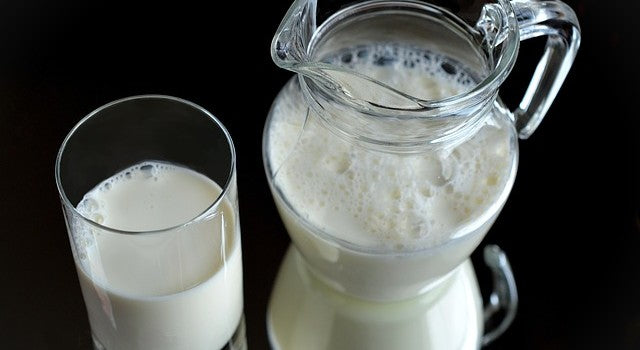Dairy products can be a tasty and welcome addition to our diet. However, they can also lead to digestive problems and hinder progress in terms of body fat reduction, more energy and muscle building. For several reasons, as I explain below.
lactose intolerance
Lactose is milk sugar, which is the natural form that carbohydrates are found in dairy products with no added sugar. Lactose intolerance, or milk sugar intolerance, is a metabolic disorder—not a disease—affecting people who lack or don't produce enough of the enzyme lactase.
Lactase breaks down the disaccharide (double sugar) lactose into its components, the monosaccharides (simple sugar), galactose (mucus sugar) and glucose (dextrose), so that these can be absorbed by the mucous membrane of the small intestine. A lack of lactase can have several causes. In healthy people, the lactase enzyme is produced in the small intestine from birth because we need it to process breast milk during breastfeeding. After that, the ability to digest milk was originally no longer intended, however, according to scientists, the ability to digest milk even in adulthood developed through a gene mutation (lactase persistence) around 7500 years ago in a region between the central Balkans and central Europe among dairy farmers developed. In people of European descent, lactase is mostly still produced in adulthood. However, in many cases, after lactation, enzyme activity gradually declines to about 5-10% of the original activity at birth, a process called hypolactasia, which can lead to lactose intolerance even if it was not present in previous years. Today about 60% of adults in Central Europe tolerate dairy products. In comparison, the milk tolerance in southern Europe is only about 20%. Almost total milk intolerance exists in most other regions of the world. A lack of lactase persistence is therefore only considered food intolerance in countries with widespread lactase persistence. In all other countries, this is the normal condition for adults.
If the lactase activity is too low, the lactose is not broken down or only partially broken down and cannot be fully or completely absorbed in the small intestine. This is how the unsplit lactose reaches the large intestine. There it is absorbed and fermented by intestinal bacteria, whereby lactate (lactic acid) - which ensures the inflow of water into the intestine - and gases are produced. Stomach pain, flatulence and diarrhea can result.
Lactose-free products are not much better
In lactose-free milk products, the lactose is broken down by adding lactase. Since glucose and galactose taste sweeter than lactose, lactose-free milk also tastes slightly sweet. However, treatments such as heating yoghurt, for example, can damage the lactase enzymes and prevent the lactose from being properly broken down. In addition, many products are also enriched with milk powder, which increases the lactose content. Even if this is not the case, lactose-free products do not contain zero percent lactose due to the lack of clear legislation. So even if there is less lactose, a few molecules can irritate the gut. If this happens every day or even with every meal, the intestines are constantly irritated and can no longer function properly. This reduces the absorption of nutrients and can lead to further problems.
Lactose isn't the only problem with milk
However, lactose intolerance is not a milk protein allergy. The milk protein allergy or cow's milk allergy is an active immune reaction due to a real allergy to cow's milk protein (primarily casein). This is more common in infants than in adults. There are also indications of connections between casein and exorphins. Exorphins are peptides that impede digestion and, similar to phytoestrogens, inhibit reproduction.
Basically, the primary problem with dairy products is lactose. The secondary problem is milk protein, especially the casein. 80% of milk protein is casein. The remaining 20% are whey proteins. Contrary to popular belief, casein is not a slow-digesting protein, but slows down digestion due to micelles. You can observe this effect if you pour milk into vinegar, for example. The casein flocculates. Casein is absorbed slowly because it slows gut motility and turns into an almost fiber-like mush. Tolerance is very poor. Undigested peptides remain in the gut and increase levels of inflammation, which over time atrophies intestinal villi and impairs nutrient absorption.
In my articles and books, I recommend dairy products such as skyr or quark, as long as you can tolerate them. In this case, they are a good and tasty source of protein. Experience has shown that casein as part of dairy products is better tolerated than pure casein, particularly as calcium caseinate in the form of protein powder. However, if skin blemishes, diarrhea, digestive problems or the YPSI skinfold measurement indicate that you cannot tolerate dairy products, you will fare much better without them. Goat's and sheep's milk are also much better tolerated than cow's milk, for example, because they contain less casein than cow's milk - but almost as much lactose. Nut "milks," such as almond or cashew milk, are a good alternative for people who have a hard time digesting real dairy products.
Good luck with or without dairy products!
Image: milk.

